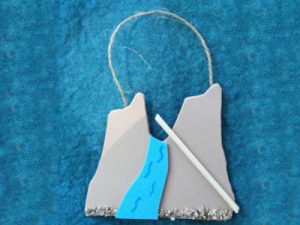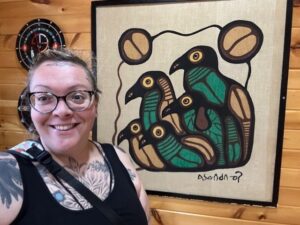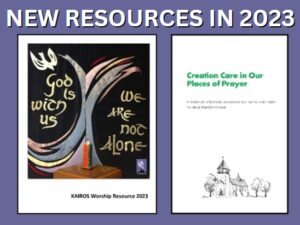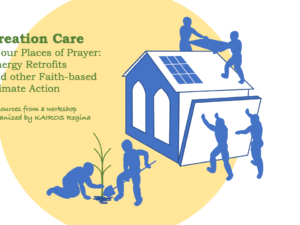Spirited Reflection: Living Water

Based on: Exodus 17:1-7; John 4:1-5, 13-17
Photo: Ornament made by the Kiilehua family using craft foam, sand and a piece of bamboo.
So… there they are, the people of Israel, wandering in the desert…lost… and they’re thirsty… and they’re afraid, and they’re mad. There’s not enough water. They have come from slavery, have been freed, but they are not happy. They are looking to someone to save them… blaming… finger-pointing.
Like the ancient Israelites, we too, are in many ways a lost people. We are unsure of where we are going and that can make us fearful and angry. Many of our hopes and dreams have not worked out. The world is not as we would want it, so we look for someone to blame. In the recent United States election, the theme that won out was change at all costs. The great American Dream is not working out for most. Fingers have been pointed at whoever is handy: the “elites”, Muslims, Mexicans, seldom at ourselves, our own choices.
Neil Diamond wrote a song once about the human condition in the 21st Century:
I am I said;
to no-one there.
And no-one heard at all not even the chair.
I am I cried.
I am said I
and I am lost and I don’t even know why
Leaving me lonely still.
We are a lonely people, by and large; thirsty and discontented. That is how the great Consumer Culture was born. In an attempt to fill the void within, we consume more than we need. We want to be winners. We demand yet more or are seduced into it. It’s never enough. We put a huge strain on the earth’s resources. The Economy dominates our thinking. We think we have to have more and more, growth at all costs. Why?
In British Columbia, a Liquefied Natural Gas (LNG) industry fed by fracking operations, created to export this fossil fuel to Asia, is being promoted. Why? What more do we need? In BC we have the fastest growing economy in Canada and the second highest employment rate in the country. The unemployment rate of 5.9% is considered full employment by most measures. An LNG industry, once established, creates relatively few ongoing jobs. On the other hand, fracking operations needed to release the natural gas consume huge volumes of water. One well pad alone in BC used 980,000,000 litres of water. The water and a cocktail of chemicals are pumped underground at high pressure to fracture the rock and release the methane trapped in the shale beds. Caleb Behn, a young Indigenous lawyer and moviemaker has likened the practice to breaking Mother Nature’s bones. The earth groans and earthquakes are sometimes created. Methane can escape in the process. Methane is a greenhouse gas 83 times as potent as carbon dioxide over a 20-year period. Groundwater is at risk of contamination. Long trains of trucks hauling the water and chemicals need an even larger network of roads, disrupting the cycles and territory of wildlife and Indigenous peoples. The wells have a very short production life, so drilling and fracking is constant in order to maintain the flow. It’s frantic. It’s never enough. Communities are often disrupted by boom and bust cycles, and creation of haves and have-nots.
In the Old Testament story, Moses goes off to find water, and lo and behold he does- from a rock of all things. The surprise isn’t that he found the water, but that it isn’t enough. The people of Israel had been, in the days of Abraham and Jacob, a desert people. Finding such a spring in the wilderness would have meant that they could dwell, and raise their herds, and their children, and be happy. It was an amazing grace, and an amazing blessing; but it is not enough. They have come from Egypt, and have seen might and power, and the lifestyle that brings, even if slaves were needed. They want that for themselves: Not just a place to live, but a land flowing with milk and honey. Abundance…. overabundance. Ignoring the fact that other people might already live there, they would take it over, change it, appropriate it for themselves, exploit it; and so they moved on, looking for progress. In the search for prosperity, they left the spring behind. Of course, when they got to the land of the Canaanites, they weren’t happy there either after a while. They then wanted a king and a kingdom and power in the region, but that’s another story.
We too, have left the spring behind, looking for progress, for prosperity. We have taken over the planet, appropriated it for ourselves, changed it, bent it to our will. Global warming is one result. And now other nations have bought in to the consumer lifestyle and clamor for what we have. China and India are next in line for embracing Consumer Culture. More CO2 in the air; more air pollution. Meanwhile, the planet gets warmer and warmer. We rush to meet the demand for fossil fuel in the US and Asia and emerging nations. We can’t exploit it fast enough, even though it too is finite. It’s not enough; we need more pipelines to burn more gas to release more bitumen and to ship more oil.
In the gospel story, Jesus too is thirsty, and meets a woman at the well. This woman is not a part of the local insiders; she is considered an outcast. She dips for water at different times than the mainstream, but is willing to share. She has had her own trouble of course; a string of failed relationships. She probably wanted to join the crowd, but instead, that day, she meets a stranger who talks of living water once again, of water for the soul that will truly satisfy; and so she takes the message back, unafraid. She proclaims that there is something else, another way, waters beneath the well of a kind never dreamed of: Water that will satisfy; a connection with God and others, contentment… a sense of place, a sense of community.
Guy Dauncey, a futurist from British Columbia has written a book entitled “Journey to the Future”. In his book, he questions the basis for our economy. According to Dauncey, our economy is based on the notion that people are basically self-interested, self-centred, and so accumulation of private capital at the expense of others has become the basis of the economy. It turns out that this is a false premise. In fact, surveys show that the vast majority of people are compassionate, empathetic and community-oriented.
Dauncey envisions a whole different economy, based on community, a whole-earth community. In this community, the common welfare is the concern. Infrastructure is designed with sustainability in mind. Villages, towns and cities are designed around meeting space instead of privacy and disconnection. Only renewable energy is used. All share in outcomes. The abundance created is a spiritual one. We are fed with living water. Our wants give way to needs of others and the Planet, yet we have enough.
Some First Nations communities are showing us the way to a greener future. One Lubicon First Nation, led by a young woman and some friends, has installed a solar power generation system shared by the community. A community garden will soon be created around this system. Other communities, Indigenous and non-indigenous alike, are re-thinking their dependence on mega-projects and large infrastructure. Smaller is becoming better. Farmers markets are expanding. The concept of the Commons, of land and resources shared that existed before Enclosure, private property and the industrial revolution emerged is being re-visited.
The situation we are facing, many believe, is dire and urgent and difficult, but not hopeless, especially with a new approach, a new paradigm. Einstein once said that we cannot solve a problem using the same mindset, worldview and perspective that created it. It is a deeply religious and spiritual project: to find the living water that can truly satisfy before it is too late, but it can happen. May it be so. Amen.
Fracking and LNG information taken from Ethical Reflections on Fracking, KAIROS Canada.
John Bullas is an ordained minister with the United Church of Canada and a member of the KAIROS Sustainability Circle.







